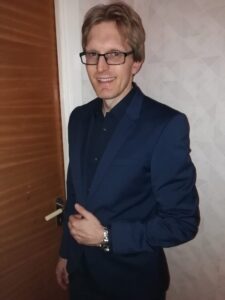As a boy with an undiagnosed Autism Spectrum disorder, my grade 2 teacher was the first and most formidably abusive authority figure with whom I was terrifyingly trapped. I cannot recall her abuse in its entirety, but I’ll nevertheless always remember how she had the immoral audacity — and especially the unethical confidence in avoiding any professional repercussions — to blatantly readily aim and fire her knee towards my groin, as I was backed up against the school hall wall. Luckily, she missed her mark, instead hitting the top of my left leg. Though there were other terrible teachers, for me she was uniquely traumatizing, especially when she wore her dark sunglasses when dealing with me. Rather than tell anyone about my ordeal with her and consciously feel victimized, I instead felt some misplaced shame: I was a ‘difficult’ boy, therefore she likely perceived me as somehow ‘deserving it’. I was much too young to perceive how a regular-school environment can become the traumatizer of susceptible children like me; the trusted educator indeed the abuser.
Perhaps not surprising, I feel that schoolteachers should receive mandatory ASD training, especially as the rate of diagnoses increases. There could also be an inclusion in standard high school curriculum of child-development science that would also teach students about the often-debilitating condition (without being overly complicated). If nothing else, the curriculum would offer students an idea/clue as to whether they themselves are emotionally/mentally compatible with the immense responsibility and strains of regular, non-ASD-child parenthood. It would explain to students how, among other aspects of the condition, people with ASD (including those with higher functioning autism) are often deemed willfully ‘difficult’ and socially incongruent, when in fact such behavior is really not a choice. It could also include how “camouflaging” or “masking” terms are used to describe ASD people pretending to naturally fit into a socially ‘normal’ environment, which causes their already high anxiety and depression levels to further increase. Of course, this exacerbation is reflected in the disproportionately high rate of suicide among ASD people.
As for my own Autism-Spectrum disordered brain, at age 56 I still am ‘undiagnosed’ [due to official-diagnosis unaffordability], though that means little to me. It’s an obvious condition with which I greatly struggle(d) while unaware until I was a half-century old that its component dysfunctions had formal names. I’m sometimes told, “But you’re so smart!” To this I immediately agitatedly reply: “But for every ‘gift’ I have, there are a corresponding three or four deficits.” It’s crippling, and on multiple levels! Besides the ASD, I also ‘live’ with a formidable combination of adverse childhood experience trauma and high sensitivity, the ACE trauma in large part being due to my ASD and high sensitivity. I self-deprecatingly refer to it as my perfect storm of train wrecks.
Coexisting with and seriously complicating this vicious combination is “core shame”. While my father had an ASD about which he wasn’t formally aware, my mother had suffered a nervous breakdowns and perhaps even postpartum depression that transpired around the time I was born. If so, it likely would have excluded shared/joyful interaction with me as an infant. It would greatly help explain why I, among other debilitating traits of core shame, have always felt oddly uncomfortable sharing my accomplishments with others, including those closest to me. And maybe explain my otherwise inexplicable almost-painful inability to accept compliments, which I had always attributed to extreme modesty. Thus, it would be very helpful to people like me to have books written about such or similar coexistent-condition life tribulations.
Largely as a result of the abovementioned, I’ve suffered enough unrelenting ACE-related hyper-anxiety to have known and enjoyed the euphoric release upon consuming alcohol and/or THC. However, the self-medicating method I utilized during most of my pre-teen years was eating, usually junk food. While “low-functioning” Autism seems to be more recognized and treated, “higher-functioning” ASD cases are typically left to fend for themselves, except for parents who can finance usually expensive specialized help. But a physically and mentally sound future should be EVERY child’s fundamental right, especially considering the very troubled world into which they never asked to enter.
Frank Sterle Jr. has edited and produced small-circulation mental-health-related publications, including The Whale Houser, since 1996. He has also had multiple pieces published in the CMHA journal Visions and previously held a part-time position as a staff reporter and contributing writer with two community newspapers, The Burnaby News and The New Westminster News.








Perhaps in great crises, every parent would go all out in an attempt to make their child feel secure; however, in stable times those parents may not notice their more subtle dysfunctional rearing. For instance, how many people are aware that even a parent’s prolonged silent but subtly noticeable anger towards his/her young child can, if frequently practiced, leave the growing child with a strong sense of vulnerability; for, the perceptive child relies on the parent(s) for survival and is therefore susceptible to hunger, etcetera, if the angry parent’s protection/provisions are withdrawn.
Meanwhile, general society perceives and treats human reproductive “rights” as though we’ll somehow, in blind anticipation, be innately inclined to sufficiently understand and appropriately nurture our children’s naturally developing minds and needs. As a moral and ethical rule, a psychologically sound as well as a physically healthy future must be all children’s foremost right — especially considering the very troubled world into which they, including ASD children, never asked to enter.